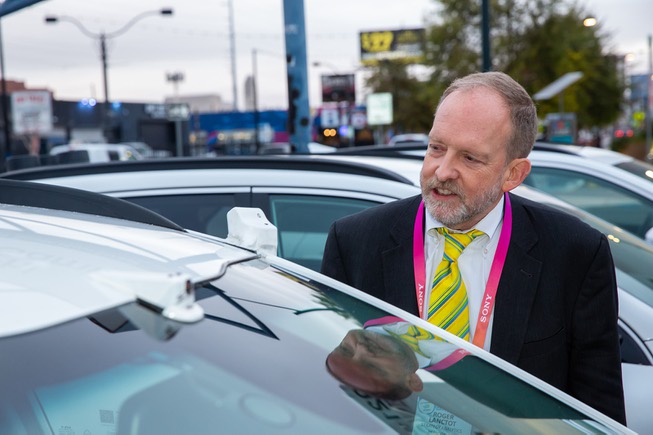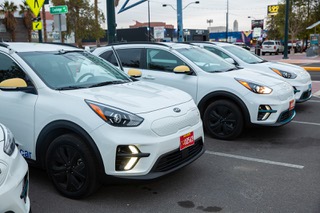
While in town for CES, tech analyst Roger Lanctot visits EV rental company Halo in downtown Las Vegas for a demo on their remote driven vehicles Wed. Jan 4, 2023.
Saturday, Jan. 7, 2023 | 2 a.m.
Roger Lanctot ventured from the Strip to a small car lot in downtown Las Vegas eager for a look at the latest in transportation: remote-control cars.
Halo.Car, a car rental service that uses electric, remote-enabled KIAs, was giving free rides as part of a promotion during the CES electronics and gadgets show. The show runs through today and brought 100,000 visitors.
While Halo already offers cars that customers can rent, the company’s goal is to provide vehicles that can be remotely delivered — a person at Halo’s headquarters would be operating the car, almost like a video game — operated by the renter, then dropped off wherever.
The service is designed to be a bridge between cars with humans behind the wheel and fully autonomous vehicles. They are based at 1001 S. Main St., next to the English Hotel.
“Halo solves the problem of delivering cars to people in need of transportation that do not have access to a vehicle,” said Lanctot, a convention-goer from Virginia. “Halo’s strategy is to work around the autonomous vehicle challenge of operating autonomously without a driver at all times.”
The leadership at Halo — about two dozen people work out of the Las Vegas headquarters, which is equipped with a service garage — is careful to not refer to the company’s service as a “driverless” offering.
During the demos this week, there’s not a person in the driver’s seat, but the car, of course, is being driven by a person remotely.
There’s always somebody driving these vehicles — most of them electric KIA Niros — whether that’s someone in a chair at the company’s headquarters or a renter in the driver’s seat.
“In our case, we have humans end-to-end, we’re not autonomous,” said Anand Nandakumar, CEO and a co-founder of Halo. “The only thing that we need to solve is the connection problem. If we have a reliable connection to the car, we can drive comfortably.”
Nandakumar hopes to roll out a fully remote — no physical driver in the car — experience to customers next month.
“Consumers like to have control,” Nandakumar said. “When you’re inside our vehicle, you drive yourself, and that’s a huge win for us. People don’t necessarily like to be in the back seat of (an autonomous) vehicle and have no control. Plus, our car comes to you, so you don’t have to go to some random parking lot and wait for two hours.”
To rent a Halo vehicle, it costs about $15 per hour with a four-hour minimum. For an entire day, it’s about $80, not including taxes and insurance fees. There’s no Halo phone application, Nandakumar said, because he and his team believe smartphone owners have too many apps as is.
If Halo, which started testing its cars in Las Vegas in 2021, gets its business model right, Lanctot said, it could find continued success. He pointed to similar services that operate in Germany and the United Kingdom.
“The proposition is interesting to rental car companies and other mobility operators who are tied to fixed locations for customers to pick up cars,” said Lanctot, the director of connected mobility at a tech analytics. “If Halo can make teleoperation of vehicles work, and can work at scale, there is a market for the technology.”
For years, American consumers have heard about the supposed autonomous vehicle revolution, which has long been expected to engulf the U.S. auto market. The revolution, however, isn’t here yet.
The overwhelming majority of vehicles on Las Vegas roadways today are operated by humans who sit in the driver’s seat.
Motional, another Las Vegas-based company, last year said it hoped to rollout a driverless robotaxi service here.
A company executive said it had a number of vehicles available on the Strip for ride share users on the Lyft network during certain times of the day. The company is being tight-lipped about how many vehicles it has on Las Vegas roadways, and exactly how a ride share user might go about hailing one.
Like at Halo, the folks at Motional appear to be busy at work as they attempt to work out various kinks.
“Until Halo proves this, it is going to look to many like a sophisticated science experiment,” Lanctot said. “The entire industry will be watching this closely. This is a major turning point for the company and for this use case.”
Part of the appeal of the service Halo is trying to provide, Nandakumar said, is that people — theoretically — don’t have to worry about buying a vehicle and storing and servicing it.
“Look at electric vehicles, they’re expensive,” Nandakumar said. “It’s a very small portion of the population that can afford a $40,000 car. Plus, these vehicles that people buy, they sit parked for 23 hours out of the day. What we’re trying to do is replace a fleet of gasoline cars with one of our cars. That’s the ultimate vision.”

